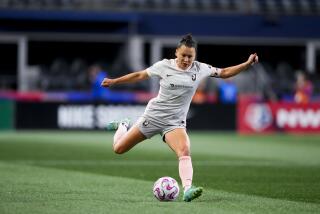Akers Hangs Up Her Cleats After Reaching All Goals
Michelle Akers, the most accomplished player in women’s soccer history, ended a glorious 15-year career Thursday by announcing her retirement from international competition.
The 34-year-old two-time world champion and Olympic gold medalist said injuries and illness had caused her to give up her place on the U.S. team for next month’s Sydney Olympic Games.
“After winning the gold medal in 1996, I promised myself to never again play in the condition I was in during those Olympic Games,” Akers said. “Since then, retirement has been a big issue with me and the decision to continue on with the national team has always been a prayerful and careful one.
“This year was no exception, and after the 1999 World Cup, I wrestled for months about whether to play or not, but eventually decided to go for it because I knew unless I was absolutely sure I had spent every possible ounce of myself trying to play, I would beat myself up with second-guessing for the rest of my life.
“But after battling back from a messed-up shoulder and making the Olympic team, I found myself at the end--physically and mentally--with a body ready for a MASH unit. It has been a hard-fought year, and the decision not to go to Sydney was just as agonizing, but I have huge peace in knowing I fought to the very end and have nothing else to give.”
Akers is the last member of the original U.S. national team, formed in 1985, to retire. She ends her international career having played 153 games for her country and is the team’s second all-time leading scorer behind Mia Hamm with 105 goals.
She made her debut for the U.S. on Aug. 21, 1985, in a 2-2 tie with Denmark in Jesolo, Italy. Her final game was against Canada last Sunday in a 1-1 tie at Arrowhead Stadium in Kansas City, Mo.
During her 15 years on the team, Akers won every conceivable honor, including being the top scorer at the first FIFA Women’s World Championship in 1991 in China, where she scored 10 goals, including two in the final as the U.S. defeated Norway, 2-1, to become the first world champion.
Five years later, she played a crucial role as the U.S. also became the first Olympic women’s soccer champion. She was honored by FIFA in 1998 when soccer’s international governing body awarded her its highest honor, the FIFA Order of Merit, for her contributions to the sport.
She had hoped to bow out after the Sydney Olympics, but in the end her ongoing eight-year battle with chronic fatigue syndrome and a succession of injuries that led to a dozen knee surgeries, numerous concussions, a broken cheekbone and most recently a dislocated shoulder, caused her to step aside.
But it was a reluctant decision.
“I knew it would be tough and I knew I would want to quit at times, but I have always been able to find something from somewhere to pull me through,” Akers said.
“Unfortunately though, things did not relent, and instead of catching a much-needed break as in the past, this time, things only got tougher. I finally said to myself, this is insane. I was taking IVs like Gatorade and getting injections and taking meds for pain. Icepacks and tape were a part of my wardrobe.”
The deciding factor came Aug. 15 when Akers re-injured her shoulder in a 7-1 victory over Russia at Annapolis, Md. It was the game in which she scored her final international goal, and afterward she was her usual high-spirited self.
“I was happy about the goal,” she said. “I was happy about being able to go 45 [minutes]. No new injuries. The shoulder’s good. It’s getting broken in for the Olympics.”
Later, however, she found out she had damaged the shoulder again.
“I was battling at my absolute gut level to just get through the day, and finally, the last straw was that I re-injured the shoulder,” she said. “Finally, I just said, enough is enough. I am no good to myself like this, and I am certainly no good to my team.”
April Heinrichs, the U.S. coach, today is expected to announce who will replace Akers on the 18-player Olympic roster.
The four alternates Heinrichs selected when she named the roster Aug. 10 were goalkeeper Jen Branam, defender Nandi Pryce, midfielder Michelle French and forward Christie Welsh. Of the four, the most likely to be chosen is French, of Portland, Ore., captain of the U.S. Under-21 national team.
Akers is considering what role to take with the Orlando team when the Women’s United Soccer Assn. (WUSA) launches the first U.S. women’s professional league next April.
Her game was built on power, speed and total commitment. At 5 feet 10, she was an intimidating force in the air and possessed a thunderous right-foot shot. Together, those qualities helped her become one of only four players in history to score more then 100 international goals.
A relentless and courageous competitor, she also has a marvelous sense of humor and an intense religious conviction. It is her personality, as much as anything, that has made her one of the sport’s legendary figures. Now, she steps aside to enjoy, as she put it, “my long-awaited career as a cowgirl on my farm in Georgia.”
More to Read
Go beyond the scoreboard
Get the latest on L.A.'s teams in the daily Sports Report newsletter.
You may occasionally receive promotional content from the Los Angeles Times.






